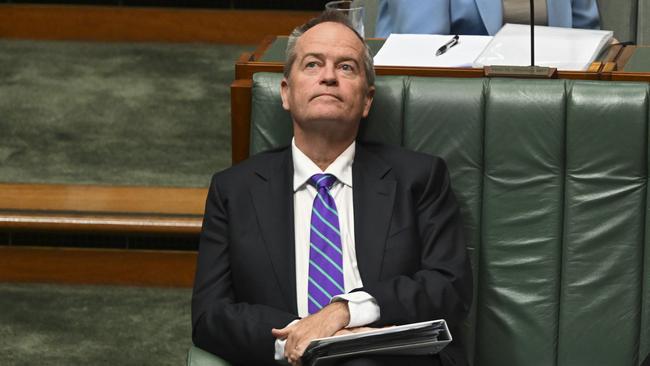Bill Shorten told to make plan to get young disabled people out of aged care homes
Disability groups have warned the Albanese government is on track to fail its own target of rescuing young people languishing in aged care, demanding a clear plan.

A coalition of disability organisations is warning the government is on track to fail its target of having no young disabled people in nursing homes by 2025 and has called for a clear plan to achieve the goal recommended by the Royal Commission into aged care.
National Disability Insurance Minister Bill Shorten confirmed after the May budget that Labor was “absolutely committed” to the 2025 goal, despite the 2022 targets not being met under the former government.
Figures from the Australian Institute of Health and Welfare released earlier this year showed more than 10,000 younger people died in residential aged care over the past decade, while a further 10,000 turned 65 while languishing in facilities – meaning they were no longer classed as “young”.
About 3,000 people under 65 are currently living in aged care, with just under 10 young Australians entering nursing homes every week.
While welcoming Labor’s commitment to the 2025 goal, disability organisations Synapse, Youngcare and the Summer Foundation expressed concern that there was “no plan” to achieve it.
“We are asking the Albanese government to take the lead in resolving this issue once and for all and … announce a timeline for getting all young people out of aged care in Australia and preventing new entrants,” the three organisations said in a letter to Mr Shorten, Aged Care Minister Anika Wells and Social Services Minister Amanda Rishworth.
Synapse national director of strategy and engagement Adam Schickerling said nursing homes were “accepting people into aged care inappropriately”.
“It’s often a matter of discharge from hospital or other settings that’s pushing them into residential aged care because there’s allegedly no other options,” he said.

Mr Shorten successfully cut down the time NDIS participants were waiting to be discharged from an average of 160 days to just 39 days, through an ambitious plan to address the backlog of 1400 disabled Australians waiting in hospital for appropriate accommodation.
However, Mr Schickerling said the numbers of disabled people under 65 ending up in aged care remained persistently high and that any decreases were due to people either ageing beyond the 65 threshold or passing away.
“If we follow this same approach that we’ve taken to date, and the way that funds have been invested and how that’s been done, then I wouldn’t be confident at all that we will achieve the target,” he said.
“Something clearly is needing to be done differently.”
Summer Foundation chief executive Di Winkler said there was just over $7m allocated in the May budget to help NDIS participants make informed decisions about where they wanted to live, but that this wouldn’t be nearly enough to achieve the goal of having no young people in aged care by 2025.
“I think with our current approach, we won’t get there,” she said.
Dr Winkler said a bigger workforce within the NDIS that could go out into aged care facilities to identify the young people placed there and provide one-on-one support to help them get out was the surest way to meet the target.
“I would like to see every younger person in aged care have, on average, about 40 hours of a transition navigator service,” she said.
Mr Shorten said the housing shortage facing the country was exasperating the challenge of getting young people in aged care into appropriate housing.
“There’s a shortage of housing in this country. So, what’s happening is a person might acquire a significant disability and in their country town or in the particular region they live in, there really is only residential aged care,” he said.
“There are some millions of dollars in our budget and also the health budget to help the process of giving people more choices. There’s money in the NDIS but we can’t get around the issue. There is just a shortage of appropriate housing, which is of course a bigger issue than just this. ”
Helen Burt, who spent more than eight years in aged care in her 50s, said she had been the same age as many of the residents’ children and felt her “energy and vitality” decline while there.
“You’re with people who were there because they consider it the end of their life and they're waiting to die,” she said.
“I think the NDIS absolutely need to be more proactive... there needs to be an action plan.”



